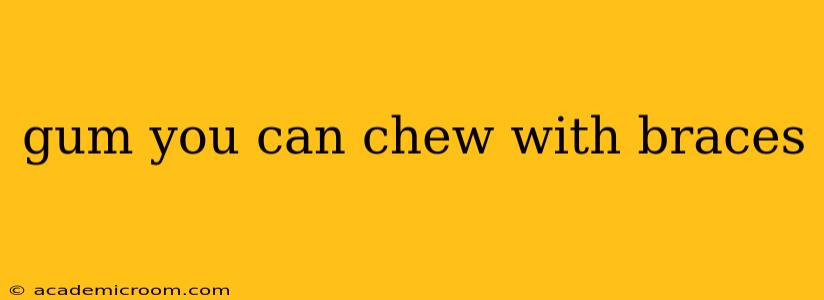Getting braces is a big step towards a straighter, healthier smile. But with all the adjustments and restrictions, you might wonder: can I still chew gum? The answer is nuanced. While chewing gum isn't outright forbidden with braces, certain types can be detrimental to your orthodontic treatment, and even potentially damage your appliance. This guide will help you navigate the world of braces-friendly gum.
What Kind of Gum Can I Chew with Braces?
The most crucial factor is sugar-free gum. Sugar feeds the bacteria in your mouth, leading to increased plaque buildup and a higher risk of cavities. With braces, cleaning your teeth thoroughly is already more challenging, so avoiding sugary gum is paramount. Look for brands that clearly state "sugar-free" on the packaging.
Beyond sugar-free, consider the texture of the gum. Avoid anything too sticky or chewy, as this can increase the risk of:
- Broken brackets: The force of chewing excessively sticky gum can dislodge brackets from your teeth, delaying your treatment and potentially causing discomfort.
- Bent wires: Similarly, the pressure from forceful chewing can bend or break the wires in your braces, requiring a visit to your orthodontist for adjustments.
- Damage to the appliance: Certain types of gum, especially those that are particularly tough, can exert undue pressure on your braces and lead to wear and tear.
Ideally, opt for soft, sugar-free gum that easily dissolves. This minimizes the risks associated with chewing. Always chew gently and avoid excessive chewing.
Is Sugar-Free Gum Safe for Braces?
While sugar-free gum is generally safer than sugary gum, it's still not completely risk-free. Remember moderation is key. Excessive chewing, even with sugar-free gum, can still lead to issues.
What to consider:
- Xylitol Gum: Some studies suggest that xylitol gum may even offer some benefits for oral health. It has been shown to reduce plaque and has antimicrobial properties. However, it’s crucial to confirm with your orthodontist whether xylitol is suitable for your specific situation.
- Amount: Limit your gum chewing. A couple of pieces per day, if your orthodontist agrees, should be fine. Avoid making it a regular habit.
- Chewing Technique: Chew gently and avoid forceful biting or pulling on the gum.
What Happens If I Chew the Wrong Gum with Braces?
Chewing the wrong type of gum can lead to various problems, including:
- Loose or broken brackets: This requires a visit to your orthodontist for repair, delaying your treatment.
- Bent or broken wires: This can cause pain and discomfort, and may also impact the effectiveness of your orthodontic treatment.
- Increased risk of cavities: Sugar in gum contributes to plaque buildup, leading to a higher chance of cavities, especially with the added challenge of cleaning around braces.
- Gum stuck in braces: Sticky gum can get stuck in your braces, making cleaning difficult and potentially harboring bacteria.
Can I Chew Gum at All with Braces?
Ultimately, the decision of whether or not to chew gum with braces should be made in consultation with your orthodontist. They can assess your specific situation and provide personalized advice. While sugar-free, soft gum might be acceptable in moderation for some, it’s crucial to prioritize your oral health and orthodontic treatment.
What Are Some Alternatives to Chewing Gum?
If your orthodontist advises against chewing gum, there are several alternatives to help satisfy the urge to chew:
- Sugar-free mints or candies: These provide a similar refreshing sensation without the risk of damaging your braces.
- Hard candies (with caution): Avoid overly hard candies that could crack a tooth.
- Chewing on a sugar-free piece of carrot or apple: These are natural and can help keep your teeth and gums healthy.
This information is for general knowledge and does not constitute professional medical advice. Always consult your orthodontist before making any decisions regarding your orthodontic treatment. Their expert opinion will ensure the best possible outcome for your smile.
